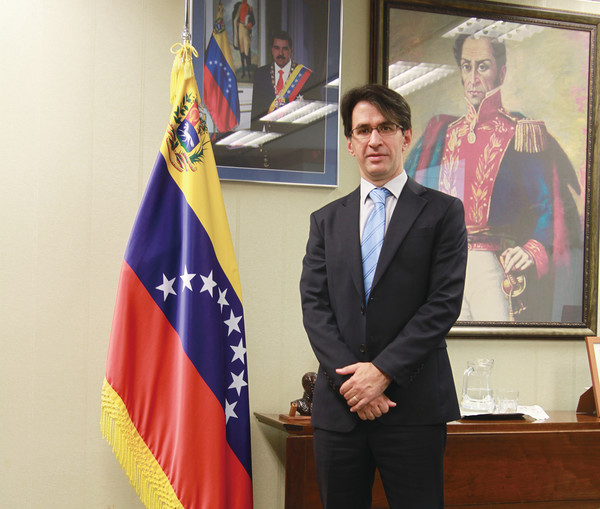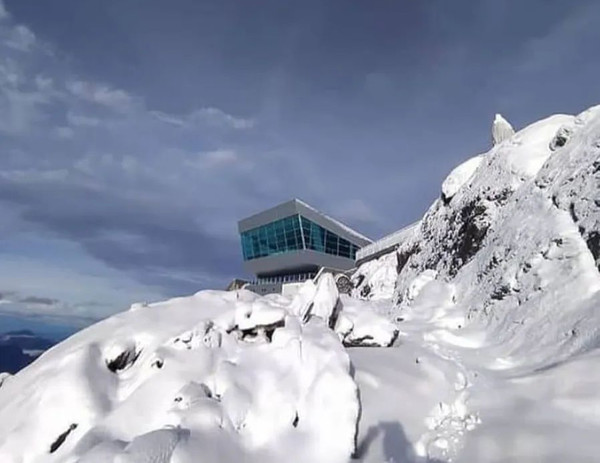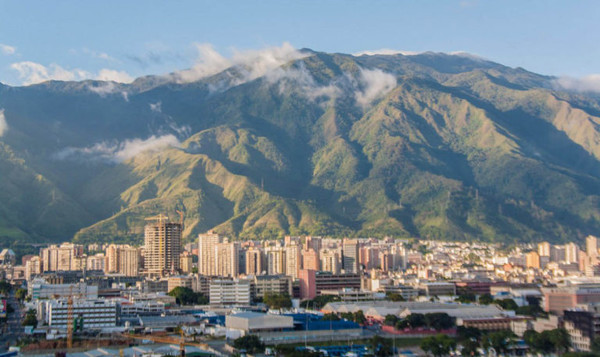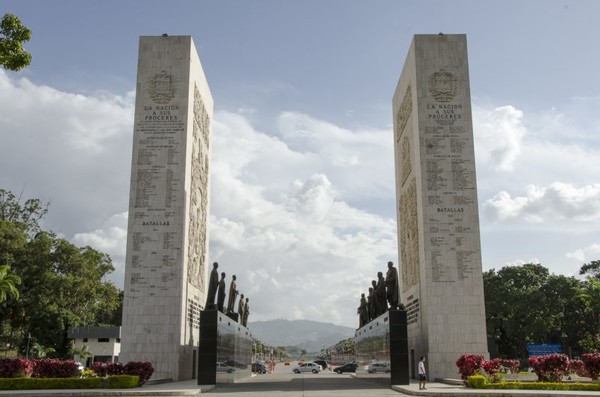
Venezuela celebrates the 210th anniversary of independence on July 5th, 2021 and 'Seoul City' magazine inferviewed Arturo Gil Pinto, Charge d' Affairs, Venezuela embassy in seoul for the prospects of the expansion of trade and investment between Venezuela and Korea in the near fatare.
Q. Please introduce the significance of your Independence Day, July 5th.
On July 5th, the Venezuelan Congress with elected representatives from all the provinces of Venezuela approved to declare the Independence of Venezuela from all imperial and colonial rule, giving birth to the Republic of Venezuela.
After 300 years of domination by the greatest empire of the time, the Spanish Empire, the movement of July 5th erupted as a civic, democratic, and libertarian movement. For us, July 5th is the date of reaffirmation of our republican, anti-colonialist and anti-imperialist determination.
After the July 5th, civic date, the Spanish empire does not recognize the determination of the Venezuelan people to be free, and the war of independence that would last until June 24, 1821, begins. On this date, independence was consolidated with the defeat of the army of the Kingdom of Spain in Venezuelan territory.
July 5, also opened the doors for the execution of the Bolivarian project of Latin American integration, with the liberation with the Bolivarian army of Colombia, Panama, Ecuador, Peru, and Bolivia in campaigns that culminated in the year 1824 in Bolivarian territory.
Q. Please introduce the most promising industries and products of Venezuela.
The Venezuelan industry until the 18th century was based on agriculture, being one of the largest producers of Cocoa and Coffee in the world, from the 19th century, the development of the oil industry began, becoming the main national industry, counting today with certified reserves of 300 billion barrels of oil, the largest oil reserve on the planet. Counting with the production of reference crudes such as the crude called Merey.
Other renowned sectors in Venezuela are the industrial sector, Iron and Steel, with the production of the Siderúrgica del Orinoco with a capacity of 5.1 million tons per year, Aluminum, with products in the different stages of the production chain from the mineral to high quality refined alumina, under the national company CVG, National cement industry, glass industry.
Mining Industry, with certified reserves of 7 thousand tons of gold, 1020 million carats of diamond, 14,678 million tons of iron, Bauxite 321 million tons, and coltan. It is the second-largest gold and iron reserve in the world and the sixth-largest diamond reserve. Other mining products are Fedespato, Silica Sand, Granite, Calcium Carbonate.
Agro-alimentary products include Rum with the controlled denomination of origin D.O.C. Ron de Venezuela, roasted Cocoa, with varieties of great prestige such as Cacao Porcelana, Guasare, Criollo Pentagona, Forastero Amazonico, Criollo Andino. Cocoa Liquor, Cocoa Butter, Cocoa Powder, Chocolate. Coffee arabica, flowers with varieties of lilies, heliconia. Fruits, mango, lime, banana, watermelon, pineapple, coconut, avocado, melon, tamarind. Buffalo cheese, goat cheese, sea salt. Shrimp, Prawns, Tajali (beltfish), trout, mussel, lionfish, snook, sawfish.
Tourist products, Caribbean islands, Los Roques, Margarita, La Tortuga. Amazonian, Salto el Angel, Roraima, Gran Sabana, Andean mountains (peak mirror teleferico 4000 meters high), cities Caracas, Maracaibo, Lecherias, Puerto la Cruz.

Q. Please, let us know what industrial sectors would be most attractive to potential Korean investors to Venezuela and also introduce it is investment environmental and special favors to foreign investors.
Our country has a favorable business environment for investment and the development of foreign trade, represented through the different traditional sectors of our economy such as oil, gas, and mining, in which foreign companies participate. On this basis, we wish to promote the participation of international capital in other sectors such as agrifood with evident comparative advantages, where we offer various economic incentives framed in Venezuelan regulations that validate the invitation we make to foreign companies to invest in our country.
In order to generate an attractive climate for foreign investors, in Venezuela, through the approval of the Constitutional Law of Foreign Productive Investment of 2017, a series of favorable conditions has been proposed. to foreign investors to consider our country as an attractive investment destination. The main objectives of this Law are: - Promote productive foreign investment to promote the integral development of the Nation, the Supreme Happiness of the People, and the strengthening of the productive and diversified economy. - Ensure that productive foreign investment generates technology transfer, value-added chains, diversification of the productive matrix, the substitution of imports, and promotion of exports, in response to the Nation's Economic and Social Development Plan. - Generate decent, fair, and productive work. - Increase and improve access to foreign financing, obtaining foreign currency, and access to new markets. - Guarantee that productive foreign investment is developed with respect to independence and national sovereignty, the integrity of the territory, human rights, the integral protection of the environment, and the preservation of life on the planet.
The Venezuelan legal framework contemplates other laws and decrees other incentives to the investor.
·Exoneration of Income Tax to the enrichments derived from the primary exploitation of agricultural, forestry, livestock, poultry, fishery, aquaculture activities.
·Exoneration of Income Tax to the net enrichments from Venezuelan sources to the catcher company of foreign investment.
·Exoneration of the payment of the Value Added Tax to the sale of machinery, equipment, supplies, and accessories destined for the production process when these are acquired by the catcher company of foreign investment and providing tourist services executed in the country.
·Exoneration of Taxes to imports of machinery, equipment, supplies, and accessories made by the catcher company of foreign investment.
·The Organic law of Science, Technology and Innovation establishes that the National Executive will be able to free from the payment of taxes, total or partially, established in tax laws for the net enrichments obtained by the foreign investors, as well as from the payment of tax of import, to the investments realized in the area of the sciences and technology.
Q. Please introduce outstanding Korean companies activities in Venezuela.
Hyundai E&C is currently working in the VONE consortium with the Venezuelan state oil company PDVSA on the construction project of the Puerto la Cruz Deep Conversion Refinery, a project that seeks to refine extra-heavy crude oil from the Orinoco Belt (the world's largest oil reserve) by upgrading it with technology developed by the Venezuelan Petroleum Research Institute INTEVEP (HDHPLUS®). The project has an approximate cost of US$8 billion and Hyundai E&C has to date made significant project engineering deliveries with engineers in Venezuela.
Small and medium-sized Korean companies are working to supply equipment to Venezuela's food and pharmaceutical industry, as well as the agri-food industry in the production of seaweed and seafood products.

Q. Please introduce tourists attraction in Venezuela for Korean tourists abroad.
Its special location to the north of South America and the extension of its territory, make Venezuela not only a Caribbean country, but also Atlantic, Andean, Guiana, llanero and Amazon; offering such a diversity of landscapes that the synthesis of South America against the Caribbean could be considered. The variety of shapes and reliefs that present the different natural landscapes of the country, allows that in its territory there are about 3,336 species and subspecies of animals including 1,315 species of birds (equivalent to 15% of the total known in the world and 40% of the 3,000 species that inhabit the neotropic) and 25,000 species of plants, which places Venezuela as one of the countries with the highest rates of diversity in the world, this allows it to house very rare species, unique in the world: it has 51 species of singular birds added to about 45 species that have a very limited geographical distribution in the world. To this, 332 reptile species, 113 amphibians, 1,195 fish and 328 mammals. For the protection and conservation of this natural wealth, Venezuela has a system of protected areas that includes 43 National Parks that cover about 16% of the National Territory and 21 Natural Monuments. In reference to Cultural Heritage, Venezuela has six hundred and forty-six (646) cultural assets declared national monuments and assets of cultural interest throughout the country, and they may be on the list of state and municipal declarations.
Venezuela has 3,726 km² of coasts, of which 1,700 km² are sandy beaches, with abundant sunshine throughout the year and calm and crystalline waters, without the set of 72 islands and islets scattered along with them in the Caribbean Sea. The above suggests landscapes that extend from the Gulf of Venezuela to the Orinoco Delta, with important natural tourist resources such as crystalline beaches, gulfs, bays, coves, cays, capes, wildlife refuges, bird watching sites, mountains, humid tropical forests, caves, rich flora and fauna, fishing, salinas, golfers, cliffs, palafitos, hot springs, brackish lagoons, rivers, national parks, natural monuments, coral reefs, islands, islets, sierras, dunes or dunes of fine sands, etc. This coastal region concentrates more than 70% of the tourist accommodation offered in Venezuela.
It is located south of the Orinoco River, made up of the Amazonas and Bolívar states. It presents a great biological diversity, where there are endemic species, minerals, abundant water, lush landscapes, rich fauna, exotic flora, abundant rivers, and endless savannas and forests. The natural resources that identify this great region are chains of 25 tepuis such as Roraima, Autana, and Auyantepui; mountains, large rivers (Orinoco, Caroní, Caruao), waterfalls and/or large waterfalls (Angel Falls), lagoons, estuaries, caves, rapids-streams, gallery forests, savannas, rainy and humid tropical forests, bromeliads such as endemic vegetation of the formation of tepuis, diversity of fauna and birds, river beaches, pipes, rocky outcrops of rivers, rocky outcrops, sites of passage and nesting of birds. In addition to the wide range of natural resources, there are other attractions that enrich this area, such as the presence of numerous local ethnic groups, craft markets, and ethnological museums, as well as the presence of castles, museums, and parks. In this area, 10% of the total housing offer is concentrated in Venezuela, where the development of tourist camps and inns predominates.
The Venezuelan Andes are the extension of the Andes Mountains. It consists of the states Táchira, Mérida, and Trujillo and part of Lara with a length of 406 km² from southwest to northwest. In addition to the scenic value of this extraordinary environment, other tourist attractions such as the Mérida Cable Car, typical Andean villages, sites of historical and archaeological interests, centers of high university studies, museums, zoos, theme parks, an astrophysical center, center are added of truchicultura, singular fairs, crafts, gastronomic offer, and traditional celebrations. The largest number of places/beds offered in the area is located in the cities of Mérida and Barquisimeto, and they are also the best-equipped service centers for tourist activity. There, approximately 20% of the total housing offer in Venezuela is concentrated. The largest offer is aimed at the market for rest and contemplation, soft adventure, trekking, trout fishing, extreme sports, bird watching, conventions, and congresses.
Located between the Andes Mountains, the Coast, and the Orinoco River, it extends from the sea through the Delta covering an area of approximately 300,000 km², occupying one-third of the national territory; it is divided by geomorphological conditions in Llanos Orientales, which includes part of the Monagas and Anzoátegui states; the Central Plains, formed by the states of Guárico, Cojedes, and Portuguesa and the Western Plains, formed by the Barinas and Apure states. In this area, you can see sandbars, river beaches, shoals, estuaries, lagoons, gallery forests, dunes or dunes, tables, as well as a varied fauna. The Llanos area has approximately 7 to 8% of Venezuela's total housing offer.

Q. Please tell us your point of view on how to strengthen further the economic and cultural ties between Venezuela and Korea.
Venezuela recognized the Republic of Korea once it joined the United Nations. In 1952, Venezuela, under the auspices of the United Nations, sent shipments of humanitarian aid to the nascent Republic of Korea, such as textiles, footwear, food, among others, valued at more than 200,000 dollars at the time (2 million today), recognizing the efforts of the Korean people in their struggle against imperialism and colonialism, values that we share as nations.
In the mid-’80s, Venezuela and Korea established resident Embassies in both countries, initiating an important exchange in the commercial area, with Venezuela being an important client of South Korean industrial products, such as commercial and military vessels.
In the 1990s and 2000s, Venezuela and Korea significantly increased their commercial exchange, as Venezuela found in Korea a partner for the supply to Venezuela of technology in the area of telecommunications, metal-mechanic machinery, and consumer goods such as household appliances.
Venezuela and Korea share republican, anti-colonial values, respect for international law, and multilateralism as a way to resolve differences. The industrial development project in Venezuela can see in Korea as an important partner, just as Korea can see in Venezuela as a partner in the energy and agri-food areas. in the Caribbean and South American region.
Based on the mutual respect we have shown each other in recent years, we can augur that our two nations can move forward in commercial and cultural relations, as well as in political relations, defending common values, complementing our cultural, geographic, and economic differences and asymmetries.

